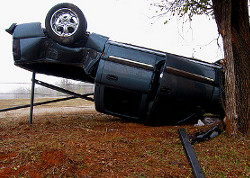32. Logical fatalism
You’re about to drive home at the end of a long day. Being tired, you worry that you might get into an accident, and thus wonder if you should first steel yourself with a cup of coffee.
But then the following bizarre reasoning occurs to you:
The ancient Greek philosopher Aristotle, to whom this perplexity was known, discussed it in terms of a sea battle that was threatening to erupt in the weeks ahead. Either the sea battle will indeed erupt, in which case it is already true that it will erupt, or else the sea battle won’t erupt, in which case it is already true that it won’t. Either way, trying to do anything now to prevent the battle from erupting is either futile or redundant.
During the Second World War, the same sort of reasoning occurred to many people in the face of a bombing raid. The bomb siren goes off and you hear a bomb screeching towards your general location. Well, either the bomb “has your number on it,” or it does not. If it does, then you will be killed, even if you rush to take cover. But if it does not, then you won’t be killed, even if you just remain where you are. As before, all precautions are pointless.
Incredibly, a fatalism of this sort rests purely on logical considerations, as opposed to causal or scientific ones. But the simple logic which generates such fatalism is also unbelievable. How could it be correct? And yet what is wrong with it?
You’re about to drive home at the end of a long day. Being tired, you worry that you might get into an accident, and thus wonder if you should first steel yourself with a cup of coffee.
But then the following bizarre reasoning occurs to you:
Either I’ll meet with an accident on my way home or I won’t.And so there is no point drinking that cup of coffee!If it’s true that I will, then whatever I care to do now, my day will end in an accident.On the other hand, if it’s true that I won’t, then whatever I care to do now, my day won’t end in an accident.So, either way, nothing I do now can change how my day is already going to end.
The ancient Greek philosopher Aristotle, to whom this perplexity was known, discussed it in terms of a sea battle that was threatening to erupt in the weeks ahead. Either the sea battle will indeed erupt, in which case it is already true that it will erupt, or else the sea battle won’t erupt, in which case it is already true that it won’t. Either way, trying to do anything now to prevent the battle from erupting is either futile or redundant.
During the Second World War, the same sort of reasoning occurred to many people in the face of a bombing raid. The bomb siren goes off and you hear a bomb screeching towards your general location. Well, either the bomb “has your number on it,” or it does not. If it does, then you will be killed, even if you rush to take cover. But if it does not, then you won’t be killed, even if you just remain where you are. As before, all precautions are pointless.
Incredibly, a fatalism of this sort rests purely on logical considerations, as opposed to causal or scientific ones. But the simple logic which generates such fatalism is also unbelievable. How could it be correct? And yet what is wrong with it?
Menu
 What’s a logical paradox?
What’s a logical paradox? Achilles & the tortoise
Achilles & the tortoise The surprise exam
The surprise exam Newcomb’s problem
Newcomb’s problem Newcomb’s problem (sassy version)
Newcomb’s problem (sassy version) Seeing and being
Seeing and being Logic test!
Logic test! Philosophers say the strangest things
Philosophers say the strangest things Favourite puzzles
Favourite puzzles Books on consciousness
Books on consciousness Philosophy videos
Philosophy videos Phinteresting
Phinteresting Philosopher biographies
Philosopher biographies Philosopher birthdays
Philosopher birthdays Draft
Draftbarang 2009-2024  wayback machine
wayback machine
 wayback machine
wayback machine

